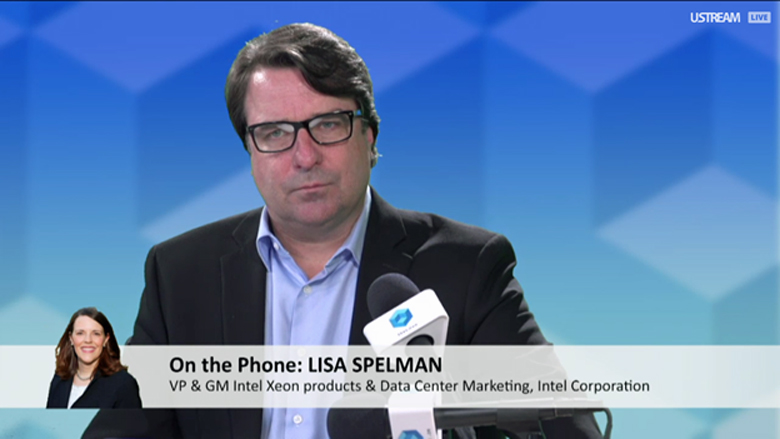 CLOUD
CLOUD
 CLOUD
CLOUD
 CLOUD
CLOUD
As Google moves from internal cloud prowess to serving the enterprise as as a cloud provider, it must have a strong hardware backbone that can provide continuous innovation and improvement over time. Alphabet Inc.-owned Google has had a long-term partnership with Intel Corp. for data center processing, most recently formed a cloud strategic alliance. This resulted in Intel’s release of Xeon Skylake chips for Google’s cloud processing.
“With this next generation of Xeon, it’s always about the processor,” said Lisa Spelman, senior vice president and general manager of Intel Xeon products and data center marketing at Intel.
She explained that with this release, Intel has gone beyond the processor, adding in platform innovations as well. Some of the features are workload acceleration for high computing workloads, which is used more and more in cloud-style infrastructures and provides strong performance improvements.
Spelman recently joined John Furrier (@furrier), SiliconANGLE Media’s mobile live streaming studio, at SiliconANGLE’s Palo Alto, CA, studio to discuss news from the Google Cloud Next 2017 event.
In addition to Xeon’s advantages for Google, Furrier and Spelman discussed the increased focus on software as a service in the cloud. (*Disclosure below.)
While infrastructure as a service receives most of the focus in cloud environments, SaaS is considered to be the bigger future focus, as organizations demand more and more services and as they become accustomed to and comfortable with moving on-prem workloads to multi- and hybrid-cloud environments.
An additional advantage to SaaS for organizations is lowering the Total Cost of Ownership. Spelman pointed out that much silicon design is based on providing multi-generations to continue to drive step function improvements, over time, optimizing Intel’s hardware and the code that runs on top of it to continue to deliver those demanding workloads.
Cloud service providers will look through the various silicon features that Intel offers and choose based on their key market or their key workload. This includes Intel’s Field-Programmable Gate Array chips, which are highly flexible in many environments and across many uses, Spelman said.
Watch the complete video interview below, and be sure to check out more of SiliconANGLE and theCUBE’s coverage of Google Cloud NEXT 2017. (*Disclosure: Some segments on SiliconANGLE Media’s theCUBE are sponsored. Sponsors have no editorial control over content on theCUBE or SiliconANGLE.)
Support our mission to keep content open and free by engaging with theCUBE community. Join theCUBE’s Alumni Trust Network, where technology leaders connect, share intelligence and create opportunities.
Founded by tech visionaries John Furrier and Dave Vellante, SiliconANGLE Media has built a dynamic ecosystem of industry-leading digital media brands that reach 15+ million elite tech professionals. Our new proprietary theCUBE AI Video Cloud is breaking ground in audience interaction, leveraging theCUBEai.com neural network to help technology companies make data-driven decisions and stay at the forefront of industry conversations.